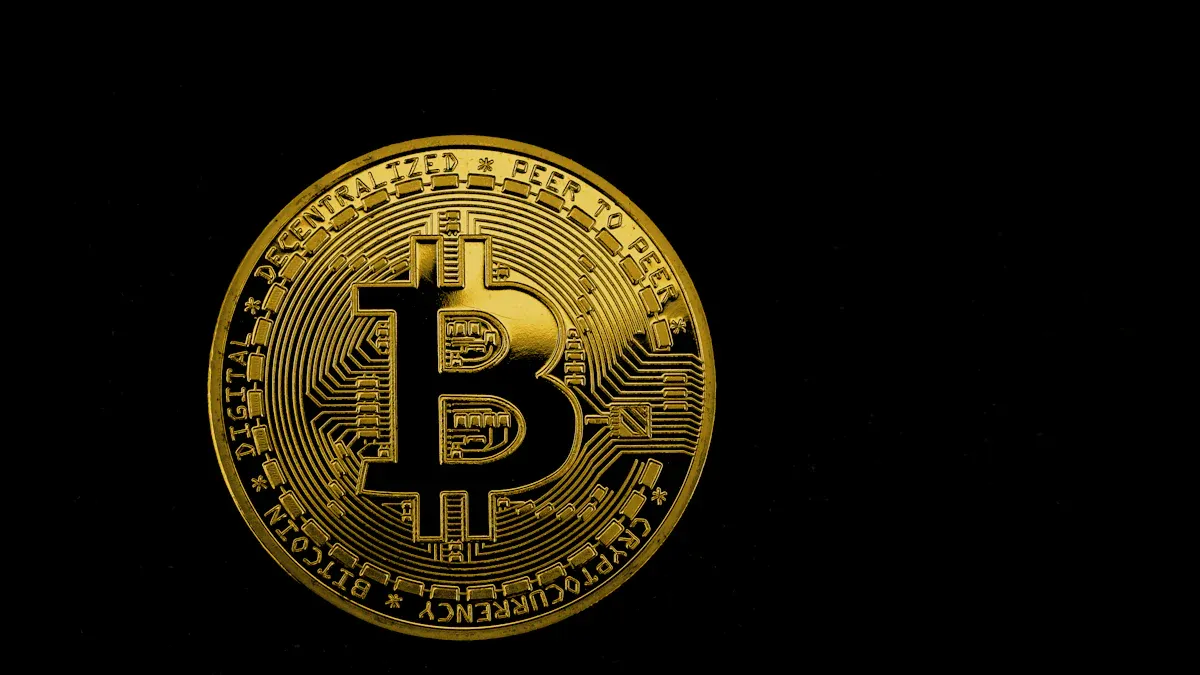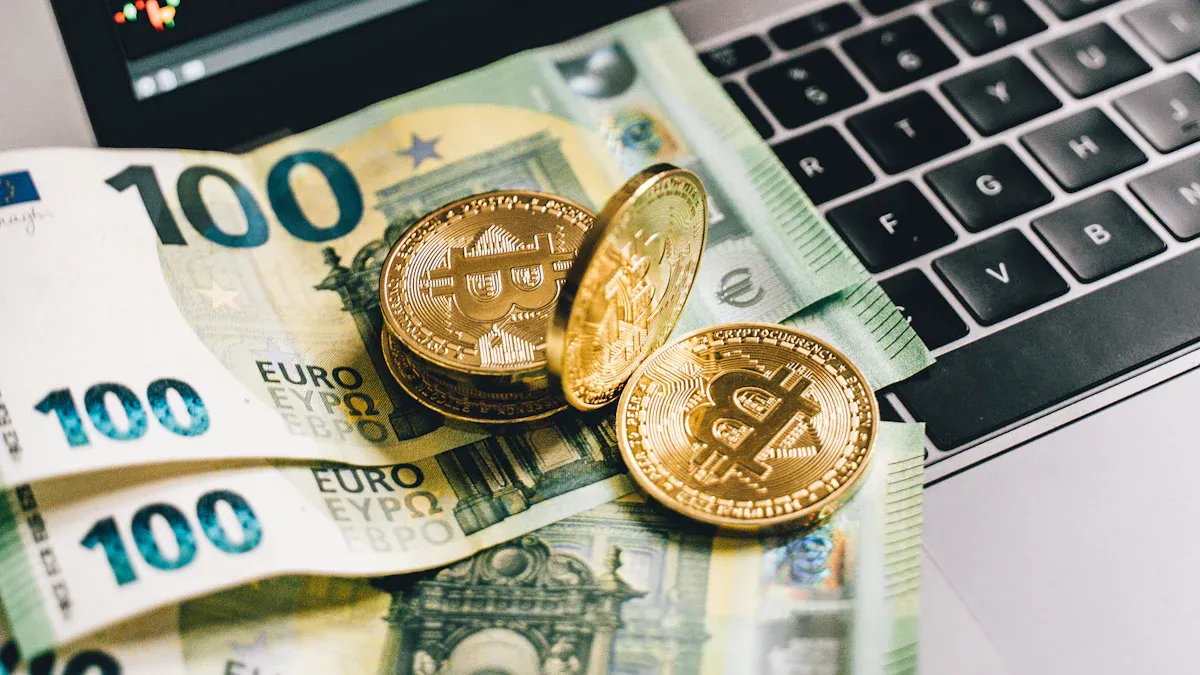What Exactly Is Cryptocurrency and Why Does It Matter
2025-11-25 07:09:14
You use cryptocurrency as a digital asset online. It is not like regular money. Cryptocurrency does not need banks or governments. Crypto uses computer networks and cryptography. Many people ask what exactly is cryptocurrency and why it is important. Today, crypto has more than 650 million users worldwide. You can see crypto changing how you pay, save, and trade.
- More than 650 million people use cryptocurrency around the world.
Key Takeaways
- Cryptocurrency is a digital asset. It lets you buy, sell, and trade online. You do not need banks or governments.
- Blockchain technology keeps your transactions safe. It works like a digital notebook. It records every transaction.
- You control your cryptocurrency. You can send and receive money directly. You do not need a bank.
- Using a cold wallet is the safest way to store crypto. Ledger and Trezor are examples. Cold wallets protect your crypto from hackers.
- Always learn about the risks of cryptocurrency. These risks include price changes and scams. This helps you make smart choices when investing.
What Exactly Is Cryptocurrency?

Digital Asset Definition
You might wonder what cryptocurrency is. Cryptocurrency is a digital asset you use online. It does not exist as paper or coins. You cannot touch it like cash. People call these assets digital currencies. You use them to buy, sell, and trade on the internet. Cryptocurrency is not just one thing. There are many types of digital assets. Some examples are bitcoin and ethereum. Others are stablecoins like USDC. There are also tokenized assets such as NFTs.
Here is a table that shows the main types of digital assets you find in the world of crypto:
| Type of Digital Asset | Examples |
|---|---|
| Cryptocurrencies | Bitcoin, Ethereum |
| Stablecoins | USDC |
| Tokenized assets | Securities, NFTs |
Bitcoin and ethereum are very popular cryptocurrencies. These digital currencies use blockchain technology. Blockchain keeps records safe and secure. It works like a digital notebook. Every transaction is stored in a block. The blocks connect in a chain. This helps you trust the information.
With crypto, you do not need a bank. You can send money straight to other people. You can also get money from them. This is different from regular money. You control your digital assets. You choose when and how to use them.
Decentralization and Cryptography
You may ask why people trust cryptocurrency. The answer is decentralization and cryptography. Decentralization means no one person or group controls the network. Many computers all over the world work together. This gives you more control over your money. In regular banks, they hold your money and make rules. With cryptocurrency, you have the power.
Decentralization lets people control their own money. This is different from banks, where they hold the power. But now, some parts of crypto are becoming more like banks. This goes against the first idea of cryptocurrencies like bitcoin.
Cryptography is about keeping things safe. In crypto, cryptography protects your transactions and identity. When you use bitcoin or ethereum, special codes keep your money safe. These codes are very hard for hackers to break.
Here is a table that shows some of the main cryptographic techniques used in cryptocurrency:
| Technique | Description | Cryptocurrency |
|---|---|---|
| ECDSA | Elliptic Curve Digital Signature Algorithm for signatures | Bitcoin, Ethereum |
| SHA-256 | Hashing algorithm used by Bitcoin | Bitcoin |
| Keccak-256 | Hashing algorithm used by Ethereum | Ethereum |
You might hear about new technology that could change security. For example:
- Shor’s algorithm could break ECDSA and put private keys at risk.
- Grover’s algorithm could make SHA-256 less strong.
Now you know what cryptocurrency is. It is a digital asset that uses blockchain, decentralization, and cryptography. You can use crypto to control your money in new ways. As you learn more, you will see how bitcoin and ethereum are changing money for the future.
How Does Cryptocurrency Work?
Blockchain Technology
You may wonder how cryptocurrency works. The answer starts with blockchain. Blockchain is like a digital notebook. It records every crypto transaction. This notebook is not kept in one place. Many computers, called nodes, have copies of it. These computers check that each record is correct.
- Blockchain is a ledger that is shared and not controlled by one person. It changes how people record and share data.
- Blocks hold the transactions that are real.
- Nodes are computers that keep the ledger safe.
- Consensus mechanisms are rules that help everyone agree.
You do not need a bank to use blockchain. You can send and get cryptocurrency straight from others. This makes crypto transactions safe and hard to change. You can trust the system because no one person is in charge. Each blockchain works in its own way. Some blockchains have thousands of nodes. Some have only a few. This can make a network stronger or weaker.
Cryptocurrency uses blockchain to keep your money safe. You can see every transaction that happens. This helps you trust crypto for payments, saving, or trading.
Mining and Transactions
You may ask how new cryptocurrency is made. The answer is mining. People use strong computers to solve hard math problems. This takes a lot of power and energy. When a problem is solved, a new block is added to the blockchain. The person who solves it gets new crypto as a reward.
Mining does more than make new coins. It keeps the network safe from attacks. Hackers need a lot of energy and hardware to cheat. This makes it very hard to break the system. For example, Bitcoin uses mining to protect every transaction.
People make thousands of crypto transactions every day. You can see how busy the networks are in this table:
| Cryptocurrency | Daily Transactions |
|---|---|
| Bitcoin | 451,023 |
| Ethereum | 1,269,000 |
You use cryptocurrency to send money, buy things, or trade. Each transaction goes into a block. The blockchain keeps it forever. You do not need a bank’s permission. You control your crypto and how you use it.
Cryptocurrency Wallets
You need a safe place for your crypto. Cryptocurrency wallets help you keep, send, and get digital assets. There are many types of wallets. Each one has its own way to keep your crypto safe.
| Wallet Name | Best Use Case | Notable Security Features |
|---|---|---|
| Ledger | Multi-chain users, DeFi dabblers | Secure Element, Bluetooth, 50+ wallet integrations |
| Trezor | Open-source purists | Open-source firmware, Secure Element |
| BitBox02 | Beginners, travelers | Dual-chip with secure element, microSD backup |
| COLDCARD | Long-term Bitcoin storage | Air-gapped, anti-tamper features |
| Keystone 3 Pro | QR signing across many chains | Fully air-gapped, Shamir backups, multiple security chips |
You pick a wallet that fits your needs. Some wallets are good for new users. Others are best for keeping crypto for a long time. You look for things like secure chips, backups, and air-gapped safety. These features help keep your crypto safe from hackers.
Tip: Always keep your wallet backup in a safe place. If you lose your backup, you could lose your crypto.
Now you know how cryptocurrency works. Blockchain records every transaction. Mining makes new coins and keeps the network safe. Wallets help you store and use your crypto. You are in charge of your digital assets every day.
Cryptocurrency vs. Traditional Money

Key Differences
There are big differences between cryptocurrency and regular money. Cryptocurrency uses a decentralized system. No government or bank controls it. You use crypto to send money directly to others. You do not need banks or middlemen. Regular money is made and managed by governments and banks. They decide how much money there is. They also make rules for using it.
You are in charge of your cryptocurrency. Banks and governments control regular money.
Transaction speed and cost are also different. Cryptocurrency networks like XRP send payments in seconds. Regular banks, like SWIFT, can take days. Crypto costs less. You pay a small fee each time. Banks often charge high fees.
| System Type | Transaction Speed | Cost (Example) |
|---|---|---|
| XRP (Cryptocurrency) | 3-5 seconds | 0.00001 XRP (minimum fee) |
| SWIFT (Traditional Banking) | 3-5 days | 2% to 7% of transaction value |
Blockchain makes cryptocurrency fast and cheap. Regular money moves slowly and costs more.
Advantages and Disadvantages
Cryptocurrency has many good points. You pay lower fees. You send money almost right away. You get more privacy. You do not need banks or other helpers. You can send money to other countries without worrying about exchange rates or high fees.
| Advantage | Description |
|---|---|
| Lower Transaction Fees | Crypto usually costs less than credit cards or bank transfers. |
| Faster Transaction Times | You can send money almost instantly because there are no middlemen. |
| Enhanced Privacy | Crypto gives you more privacy than regular money. |
| Bypassing Intermediaries | You trade crypto directly with others, saving time and money. |
| Simplified International Payments | Crypto helps you avoid exchange rate changes and high bank fees. |
There are also risks with cryptocurrency. Prices can change very fast. The market can go up and down a lot. Rules for crypto are not clear in many places. You might lose access if laws change. Security problems are real. In 2024, people in the U.S. lost $1.4 billion to scams and hacks.
| Risk Type | Description |
|---|---|
| Extreme Volatility | Crypto prices can go up and down quickly, so it is risky. |
| Regulatory Uncertainty | Rules for crypto are different in each country, which can cause problems for users. |
| Security Threats | In 2024, people in the U.S. lost $1.4 billion to scams and hacks. |
You think about the good and bad before using cryptocurrency. You see how bitcoin and other digital money are changing what money means.
Why Cryptocurrency Matters
Real-World Uses
Cryptocurrency is changing how people and businesses work. Many companies use crypto for real payments now. You can see this in different areas:
- Finance: Apps help you send crypto fast and cheap.
- Healthcare: Hospitals use blockchain to keep patient records safe.
- Logistics: Companies use blockchain to track goods better.
There are new uses in other fields too:
- Real estate sites like Brickken and RealT let you own part of a rental property with tokens.
- Big banks like JPMorgan make tokenized funds and government bonds.
- Gold and other things now have tokens that show real value.
People use cryptocurrency to send money to other countries. You can send money to family with stablecoins. These coins are about 3-4% of all global money sent home. Some workers get paid in crypto on sites like Remote and Deel. Businesses use stablecoins for quick and cheap payments across borders.
Benefits and Risks
Many people join the crypto market for different reasons. Some believe cryptocurrency will grow a lot. Others want to spread out their investments or learn about blockchain. Some use bitcoin to keep their money safe from inflation.
| Benefit | Percentage of Respondents |
|---|---|
| Strong long-term growth potential | 53% |
| Diversification of investment portfolios | 48% |
| Interest in blockchain technology | 42% |
| Protection from inflation and economic uncertainty | 35% |
You should know about the risks too. Crypto prices can change very fast. Hackers try to steal from wallets and exchanges. If you lose your private key, you lose your crypto. Some countries do not allow crypto trading. Scams and fake ads can trick people. One person lost $97,000 in a bitcoin scam.
Always check before you send money or share wallet info. Being careful helps you stay safe in crypto.
Now you see how cryptocurrency and bitcoin are changing money. You can use crypto for real needs, but you must watch out for risks.
Getting Started With Cryptocurrency
Buying and Selling
You can begin with crypto by picking a trusted platform. Many people use crypto exchanges to buy and sell digital assets. Some popular crypto exchanges are:
- Binance
- Coinbase
- FameEX
- Kraken
- Crypto.com
- OKX
- Bybit
- KuCoin
- MEXC
To buy bitcoin or other crypto for the first time, you follow a few easy steps:
- Download a non-custodial wallet like Best Wallet. This wallet lets you pay quickly.
- Make a PIN, write down your seed phrase, and turn on two-factor authentication and biometrics.
- Decide how much bitcoin you want to buy. Think about your goals and how much risk you want.
- Tap Buy and bitcoin, pick how you want to pay, and finish your purchase.
- If you use a custodial wallet, move your bitcoin to a non-custodial wallet. This keeps your crypto safer.
You can trade on crypto exchanges, but always check their security before you trust them with your money.
Storing Safely
After you buy crypto, you need to keep it safe. You can use hot wallets or cold wallets. Hot wallets are online and easy to use. But they have more risks. Cold wallets, like Ledger or Trezor, keep your bitcoin offline. This gives you more safety.
| Wallet Type | Convenience | Risk |
|---|---|---|
| Hot Wallet | High - Quick access for frequent transactions | High - Vulnerable to online threats |
| Cold Wallet | Low - Less convenient for regular access | Low - Enhanced security by keeping private keys offline |
To keep your crypto safe, you should:
- Use strong passwords that are different for each account. A password manager can help.
- Turn on two-factor authentication for your accounts.
- Keep your wallet software up to date.
- Never share your private keys or put them online.
- Back up your wallet and keep the backup in a safe place.
- Watch out for fake websites and phishing scams.
Tip: Only keep the crypto you use every day in hot wallets. Store most of your bitcoin in cold wallets for better safety.
Beginner Tips
Starting with crypto can feel hard. Many beginners make mistakes like buying because of hype, bad timing, or putting all their money in one asset. You can avoid these mistakes by learning and planning.
- Do not buy bitcoin just because everyone is talking about it.
- Spread your money across different assets to lower your risk.
- Check your crypto often and stay organized.
- Take breaks if you feel overwhelmed.
You can find guides, tutorials, and tools online to help you learn about crypto and bitcoin. Many resources explain how wallets work and answer common questions. Stay curious and keep learning so you can make smart choices in crypto.
You now know that cryptocurrency is a digital asset you use online. You are in charge of your own crypto. Blockchain, mining, and wallets all help keep your money safe.
People now think Bitcoin is a steady investment. This is because there are better rules and more support.
Here are some new trends:
- Venture capital for crypto startups fell by 59% in Q3 2025.
- The U.S. has the most deals and investments.
- More money is going to older, bigger companies.
- More people are interested in bitcoin and Ethereum ETPs.
You can keep learning by doing these things:
| Recommended Steps | Description |
|---|---|
| Try Different Trading Strategies | Use 'HODL' or 'Trade the News' to see how prices change. |
| Learn to Read Basic Charts | Look at candlestick charts to find price moves. |
| Use Risk Management Strategies | Set stop-loss orders and choose how much to invest to keep your money safe. |
Keep asking questions and be careful as you learn about cryptocurrency.
FAQ
What is the safest way to store cryptocurrency?
You should use a cold wallet, like Ledger or Trezor. Cold wallets keep your crypto offline and away from hackers. Always make a backup of your wallet. Keep your backup in a safe spot.
Can you lose all your cryptocurrency if you forget your password?
Yes, you can lose your crypto if you forget your password or seed phrase. You need to write down your backup phrase and keep it safe. Without your backup, you cannot get your crypto back.
How do you buy cryptocurrency for the first time?
First, pick a trusted exchange like Coinbase or Binance. Make an account and prove who you are. Add money to your account. Pick the cryptocurrency you want and buy it. Always check if the platform is safe.
Is cryptocurrency legal in every country?
No, some countries do not allow cryptocurrency. You should check your local laws before you buy or trade crypto. Rules can change, so stay updated to avoid trouble.
What are the main risks of using cryptocurrency?
| Risk | Description |
|---|---|
| Volatility | Prices can go up or down fast |
| Scams | Hackers try to steal from wallets |
| Regulation | Laws about crypto can change |
Tip: Always learn and use strong security to keep your crypto safe.